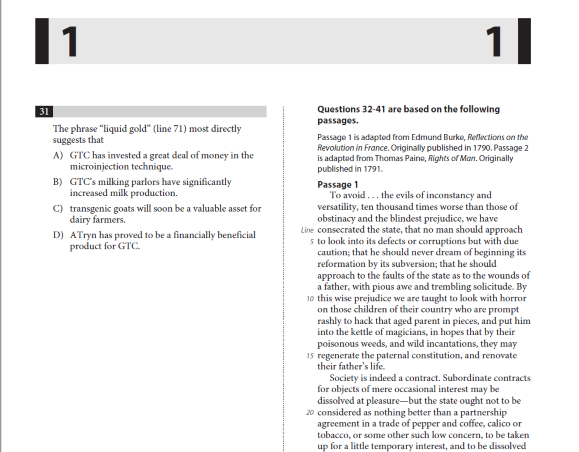While the COVID era has raised new questions about the S.A.T. and other standardized tests, for many students, the S.A.T. appears here to stay. In Florida, Florida BEST Standards will require high schoolers to take (though not pass) the S.A.T. or A.C.T., and ambitious students have continued to demand access to the S.A.T even where it is no longer required.
Yet—as most people are aware—the S.A.T. is not a neutral test.
Long billed as a neutral test of “scholastic aptitude,” the S.A.T. actually demands that students have some culturally specific knowledge and background. As studies have shown, students who have received a certain kind of education are likelier to score higher on the Reading and Writing portions of the test.[1] One of the reasons for this phenomenon is simple: these students have been exposed to more classical literature.
For me, a striking example comes from the College Board’s recent Practice Test #4 (since removed). In the historical “double passage” on the Reading section of the test, students are presented with a selection from Edmund Burke’s Reflections on the Revolution in France (1790) and Thomas Paine’s Rights of Man (1791):

How easily do you understand?
Certainly, a student who has never heard of Edmund Burke, Thomas Paine, or the French Revolution can still do well on this passage. Nevertheless, a basic familiarity with the underlying subject matter definitely helps. How else can a student be expected to know what the “evils of inconstancy and versatility” refer to, or what Burke means by a “constitution”?
In short, at least when it comes to reading comprehension, “context is everything.” As many studies also suggest, students do better when they know more about the subject matter that they’re reading.[2]
At Crack the Books Tutoring, I believe that teaching context and cultural literacy is an essential component of improving literacy skills in general. We need more cultural content in our schooling, not less.
[1] See, e.g., Rebecca Zwick, “Is the S.A.T. a ‘Wealth Test’? The Link Between Educational Achievement and Socioeconomic Status,” Rethinking the S.A.T.: The Future of Standardized Testing in University Admissions, edited by Zwick, Routledge, 2004, pp. 203–16.
[2] E.g., see the results (for native English speakers) in Patricia L. Carrell and Bill Wallace, “Background Knowledge: Context and Familiarity in Reading Comprehension,” On TESOL ’82: Pacific Perspectives on Language Learning and Teaching, edited by Mark A. Clarke and Jean Handscombe, TESOL, 1983, pp. 295–307.







